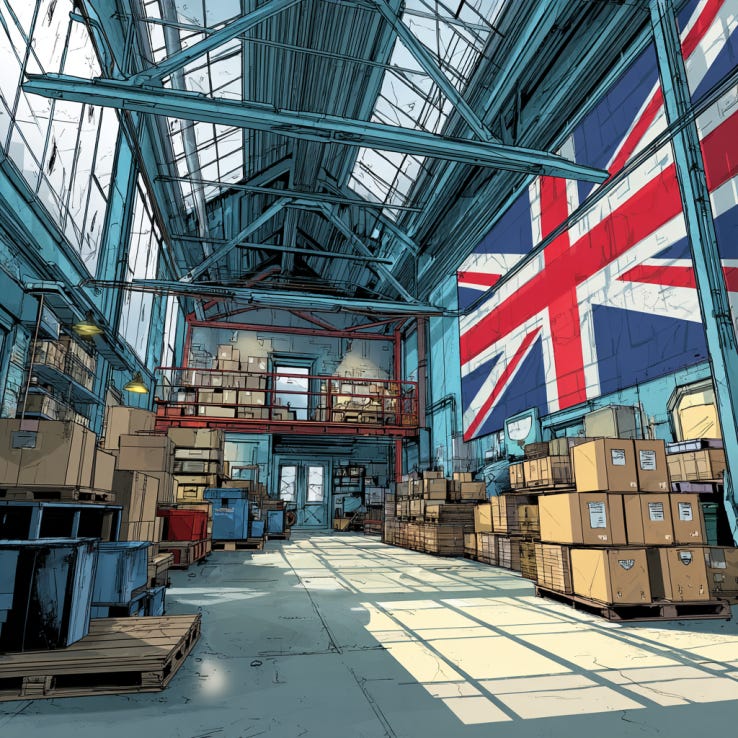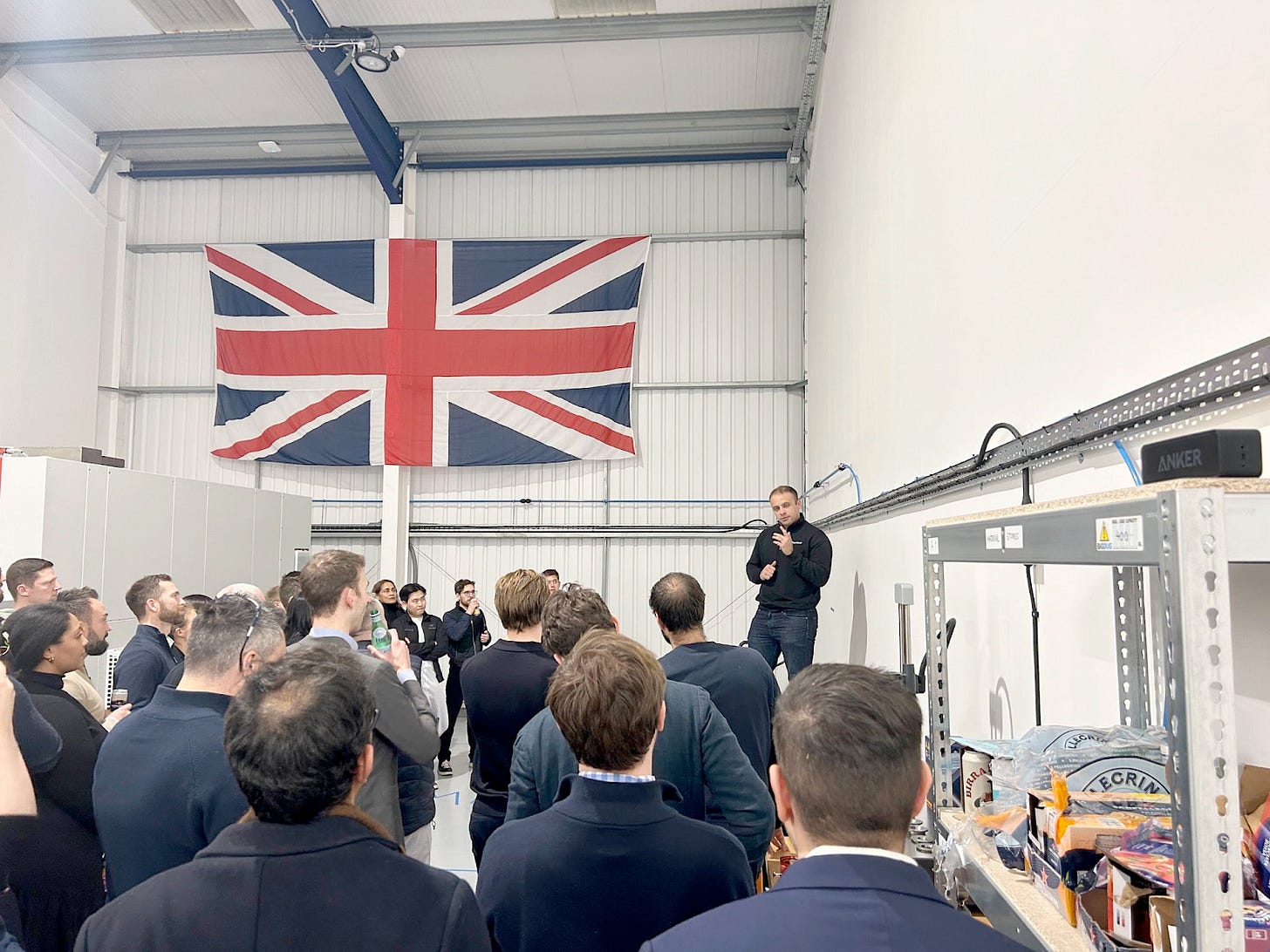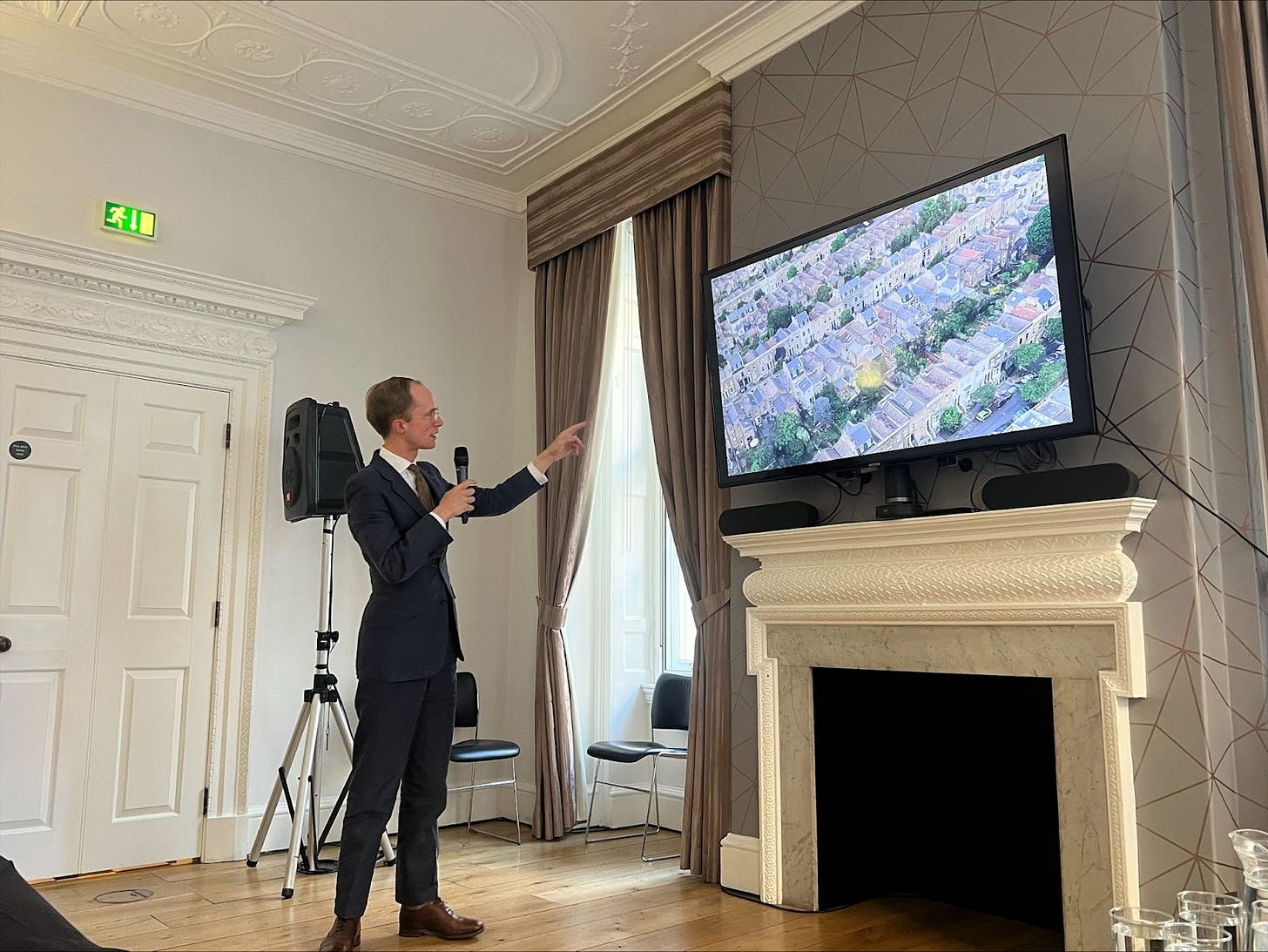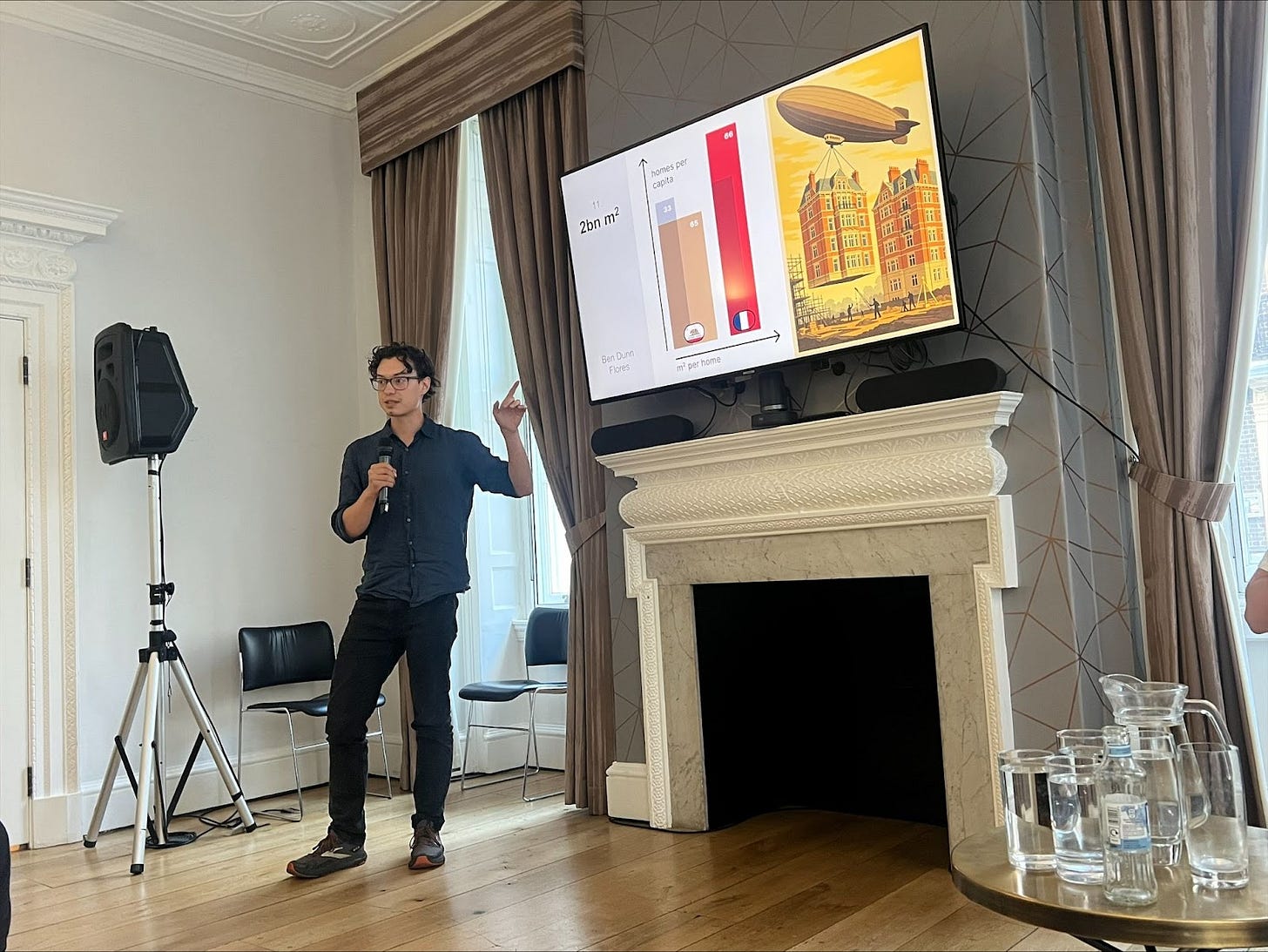How to build a factory in London
Interview with Alexander Fitzgerald, Founder and CEO of Isembard
Written by Joe Hill for the Greater London Project.
London’s economy today is built on services. The City of London is still a global financial centre, and the capital is a huge exporter of British law and legal services, hosts internationally competitive creative industries, and remains Europe’s leading tech hub.
One thing we don’t associate with London is manufacturing – despite a long history of making things in the city. From the 18th to the mid 20th centuries, London was an industrial hub, competing with Birmingham, Manchester, Sheffield and Liverpool for workers and factory space. But along with the rest of the country, since the Second World War London’s manufacturing sector has shrunk.
Could that ever change? Isembard, a new start up based in Park Royal, is betting big that it will. Isembard raised £7 million in seed funding to build a software-first manufacturing business, aiming to automate large parts of the industrial supply chain and usher in a new era of advanced manufacturing businesses - not just in the UK, but in the West as a whole.
Isembard’s Founder and CEO Alexander Fitzgerald showed me around their first site in Park Royal, West London, and we talked about what they’re up to.
J: Isembard Kingdom Brunel has a big legacy. What are you hoping people will take from naming your company after him?
A: Reclaiming a lost sense of purpose as a nation and society. To me, the most important thing in a business is not the product, the business model or the technology. It is the mission. That is the foundation on which everything else stands. It's how you recruit your first team members, and it’s through them that everything else flows.
The Isembard mission speaks for itself. Production lies at the route of everything. It's how we as humanity have sharped the Earth, and eventually how we’ll shape the stars. We need to get better at accelerating the scale of production in the most critical industries. And Isembard will do just that.
J: Is there a future for British manufacturing today? Many people think its fortunes are bleak?
A: Those people are wrong. We have all the fundamentals to be successful at manufacturing here in the UK. A huge head start in critical industries such as defence and aerospace. A globally competitive software engineering market. Great universities. Formula 1. The materials are all there. Now we just need to process them in the right way, and Isembard is how we want to bring those together.
I see us as building the AWS (Amazon Web Services) of critical industry manufacturing. In the old world, before AWS, companies used to have to run their own servers. That was incredibly inefficient. Centralising compute capacity in datacentres, allowing customers to draw down on what they need when they need it, has revolutionised software. Manufacturing today is in that same state - it’s decentralised, a sector made up of lots and lots of small machine shops. It makes sense to centralise manufacturing capacity. That is what we are building across the country. Factories which can be used directly by customers, with automated pipelines to get the products they need.
J: Manufacturing isn’t a sector that start up founders and venture investors have traditionally wanted to work in. We’re seeing a pivot to ‘deep tech’ and hardware based companies now, what is driving that?
A: There is no defensibility anymore in software-only business models. The ‘moats’ people used to rely on to defend their business models from competitors are all drying up now that AI can develop software and solve knowledge problems for start ups. Plus, you can only solve most real problems in the world with a combination of hardware and software. The world has enough carbon accounting software businesses. We need to focus on actually producing green electrons in the real world.
J: Lots of the challenges with the manufacturing sector are due to an ageing workforce which we’re struggling to replace. Is that solvable by a start up?
A: Yes. The problem is largely due to three things. Ambition, talent and success. For ambitious people you need ambitious companies to join. But companies targeting an increase in earrings per share of 20 basis points a quarter is not ambitious, or worthwhile calling for the best and the brightest. Colonising the moon is. Second, the greatest talent moves to the greatest problems and finds other talent to work with. There is a change going on. The most talented people are choosing quests with more worthwhile aims than their predecessors did. And finally, success. There’s no point being ambitious without actually achieving anything.
J: Most people associate manufacturing, including advanced manufacturing, with economies in the north or west of England. Why base yourselves in London?
A: Access to software talent, customers and investors. London is still the best place in the UK for all three. Our HQ is in London but we’re expanding across the UK and internationally.
J: We have had writers for the Greater London Project suggest developing more of the Park Royal area (where Isembard is based) into housing, rather than manufacturing. The area commands much lower property prices because the Strategic Industrial Land designation stops it being developed. Is it good that we restrict big areas of London for manufacturing only, when there’s much more demand for other uses?
A: Yes. There’s no point building houses if everyone is commuting to a desk job that will be automated in the next few months. AI is going to undercut lots of the service economy that London is based on, so its mix of businesses and jobs needs to shift. People used to think that robots were coming for all the manufacturing jobs, not services, so you should learn how to do a desk job. They’re wrong, the change is happening the other way around.
ChatGPT is coming for you if all that you do is push pixels around a screen. You want to be out working in the real world.
J: You are one of the organisers of the London Defence Hackathon, which has now run two years in a row. And you’re an Army reservist as well as a startup founder. Historically, some people in tech have been uncomfortable working with defence, and many people in defence have found it hard to work effectively with startups. What’s changed?
A: Each of us has a debt to society which we must repay. We repay it in the form of good manners, working hard and doing the right thing. My mum immigrated to the UK, my dad was a factory worker's son and became a successful lawyer, and a country where that can happen is only possible because “rough men stand ready to do violence on our behalf”.
What's changed? Ukraine. I think it was easier for British people to detach from war when it’s fought between people who aren’t European, and it just felt like something which happened to other people. Ukraine obviously changed that.
Q: Like me, you were a civil servant in the Treasury in a previous life. Do policymakers have the right approach to start-ups and the renaissance of interest in manufacturing? If you could ask them for one thing, what would it be?
A: No, unfortunately they don’t yet, but they are getting there!
We need more financing support for small to medium sized businesses in purchasing/renting machine tools. Machine tools (costing anywhere from hundreds of thousands to millions) are the atomic unit of manufacturing progress. Lowering the cost and speed of access to this tooling will help advanced manufacturing businesses blossom in Britain, until we’re a colossus of industry again.
J: In twenty years time, what do you think the future holds for London, and Britain? What’s the best version of that, and how do we get there?
A: We are in the top three to four countries as a share of global GDP. Manufacturing has risen as a share of our GDP. London has become the world’s centre of AI . Britain has more successful startups per capita than any country in the world.
We need to pick winners, demolish barriers, cut non-security-related state spending, and get out of the way of progress and growth.
If you're an industrialist or a policymaker who wants to visit a modern software-first factory, get in touch with Alexander [dot] Fitzgerald [at] Isembard [dot] com.
—
Community notes:
What we’ve been reading:
Jim Waterson for London Centric on ‘Asif Aziz: The billionaire and the tax evading gift shops’
Sean Eke for Re:State on ‘London and New York City: Governing ungovernable cities’
Michael Dnes on ‘What really ate Ebbsfleet’ (threaded here)
Benedict Springbett’s explainer of judicial review.
Simon French in The Times on Abundance economics for the UK.
And these amazing old photos of the demolition and rebuilding of the Bank of England.
What we’ve been listening to: ‘The Underrated Economics of Land with Mike Bird’, on the Works in Progress podcast.
Fun fact: did you know that Robert Moses built 650 playgrounds in New York City? More detail here.
Jobs:
The Greater London Authority are hiring for two Assistant Development Managers.
The City of London Corporation are hiring for a City Business and Investment Director.
Impact on Urban Health are hiring for a Director of Policy, Influencing and Change.
And thank you to everyone who came to our first Lightning Talks event last month, kindly hosted by the RSA! We had a great turnout to hear twelve speakers give five minute talks on anything they wanted to do with London.






